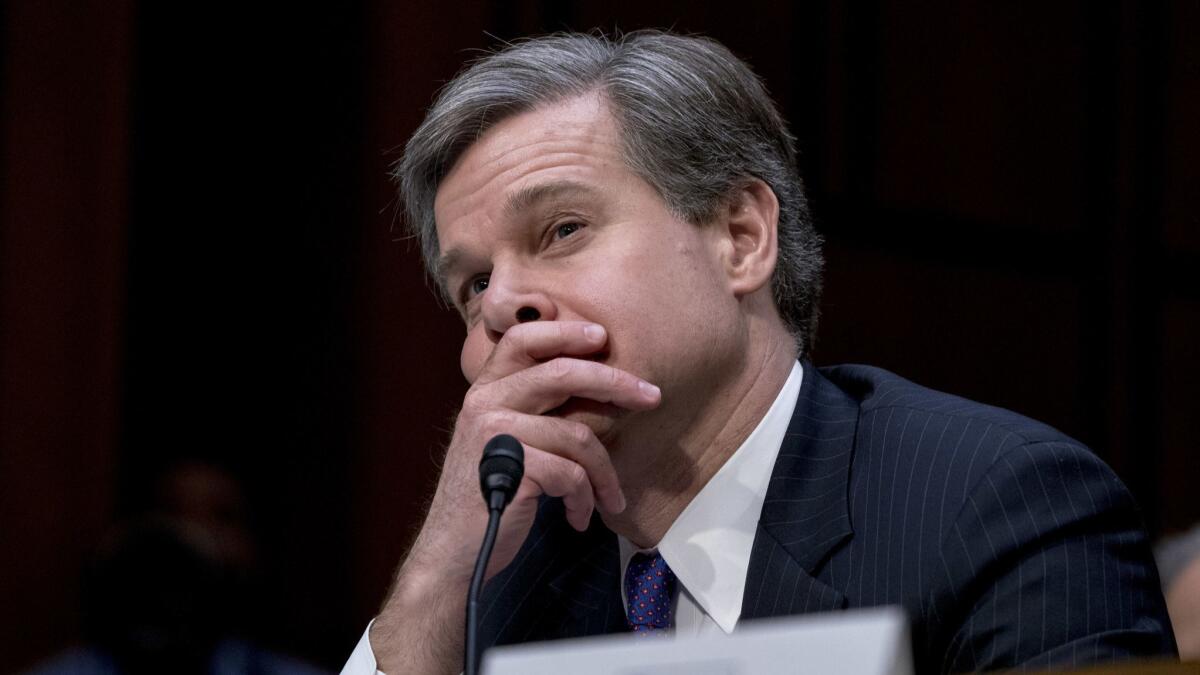Op-Ed: Targeting Chinese students and entrepreneurs in the U.S. is the wrong way to battle Beijing

- Share via
As U.S.-China friction escalates, the rhetoric in Washington has grown increasingly ugly and hostile. The Trump administration, concerned about intellectual property theft and other questionable behavior on the part of Beijing, has embarked on a program of targeting students and professionals of Chinese descent. Not only are these actions antithetical to America’s immigrant roots, they are damaging to U.S. interests and competitiveness. Stoking racial divides is exactly the wrong way to fight the problem.
The U.S. has long had policy differences with the People’s Republic of China, but the current White House and the national security community have ratcheted up those differences into a war on Western democratic ideals.
In his testimony before Congress last year, FBI Director Christopher A. Wray said that Chinese students and researchers represented a “whole-of-society threat”; in other words, to the American way of life. Later, a State Department official, Kiron Skinner, racialized the conflict: For the first time, the U.S., she said, is facing “a great power competitor that is not Caucasian.”
This culturally charged, zero-sum mentality has already translated into anti-Chinese policies.
This culturally charged, zero-sum mentality has already translated into anti-Chinese policies. Student and work visas for Chinese nationals have been curtailed. In early 2017, the Trump administration began whittling away at the Optional Practical Training Program, an important channel for Chinese students, especially STEM majors, wishing to stay and work in the U.S. Last year, Chinese nationals studying robotics, aviation and other high-tech subjects were issued one-year visas instead of five-year ones. The State Department also increased its scrutiny of visa applicants, causing major delays and uncertainty for tourists, students and for U.S. companies wishing to hire Chinese employees.
All of these actions hark back to a shameful chapter in American history, especially the dark ages of the Chinese Exclusion Act, signed into law in 1882. The exclusion act not only blocked immigration from China, it institutionalized discrimination against Chinese in this country and reflected an attempt to deny what Chinese immigrants had already contributed to the United States. It wasn’t repealed until 1943. Its current echoes in racially charged and irresponsible rhetoric threaten our values, and our economic interests.
For starters, limiting visas for Chinese students, scientists, business leaders and tourists harms what amounts to a valuable U.S. “export” — exceptional knowledge, research programming and global economic interconnectedness. Students from abroad, a large number from China, spent an estimated $39 billion in the United States during the 2017-18 academic year. In the tourism sector, Chinese are estimated to spend on average $6,700 per person when they visit here, much higher than other international visitors. Last year, however, with China-U.S. hostilities rising, Chinese tourism fell 5.7%, the first decline in 15 years.
The impact of anti-Chinese policies and sentiment will be even greater, long term, on American technology. According to the National Science Foundation, foreign citizens account for more than half of the nation’s graduate students in engineering. Chinese citizens in particular represent one quarter of all those doing advanced artificial intelligence research globally. More than half this group was educated in the U.S., and some of them have gone on to start up companies and create American jobs. If they aren’t encouraged to stay on and work here, it will represent a huge loss of U.S.-nurtured talent.
Alienating an entire generation of Chinese scholars, researchers and professionals — and assuming that U.S.-China tensions are inevitable — simply isn’t necessary in order to respond to intellectual property theft and other illegal behavior connected to entities and individuals in the People’s Republic. Instead, policymakers can clearly define and minimize the areas of our economy to be walled off from foreign participation. At the same time, they must reject recriminations based on race or culture. The guiding concept should be, in former Defense Secretary Robert Gates’ phrase, “small yard, high fences.”
Washington needs to spell out specific technologies and research areas directly relevant to U.S. national security (small yards) and draw appropriate strategic boundaries (high fences). A narrow focus on, say, quantum encryption or hypersonic propulsion may be justified, but not blocking Chinese participation in all U.S. artificial intelligence or biotechnology research and development.
Enter the Fray: First takes on the news of the minute »
So far, the Trump administration has been building incoherent fences around entire swaths of the economy and higher education. Fencing in a smaller yard would help regulators to more effectively screen for harmful activity within those bounds, while limiting the collateral damage to neighboring sectors.
In areas that aren’t fenced off, the government should aggressively adopt and enforce laws and regulations meant to counter undesirable behavior. For example, better, more targeted background checks could keep researchers with unwanted affiliations out of U.S. universities. Companies known to steal intellectual property could be denied access to our markets. Offenses should be heavily penalized, but the grounds for investigation into espionage must be nondiscriminatory and based on facts, not on race.
The United States must be a leader for what is right. We can welcome greater foreign participation in our economy and still protect American intellectual property. We can defend our national security and still celebrate a multicultural society. We are smarter and stronger when we honor what defines us as a nation: openness, diversity and intellectual curiosity.
Dominic Ng is the chairman and chief executive of East West Bank.
Follow the Opinion section on Twitter @latimesopinion and Facebook.
More to Read
A cure for the common opinion
Get thought-provoking perspectives with our weekly newsletter.
You may occasionally receive promotional content from the Los Angeles Times.






